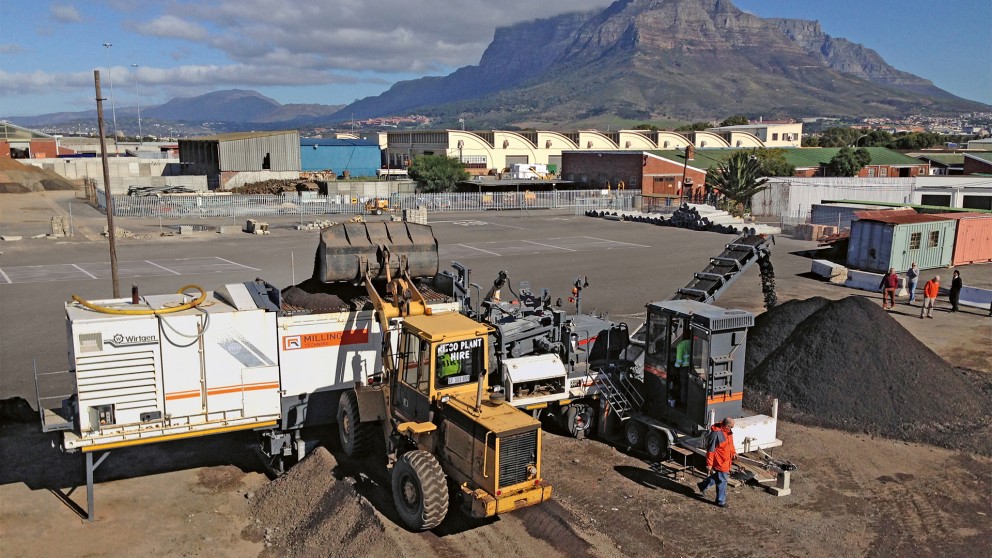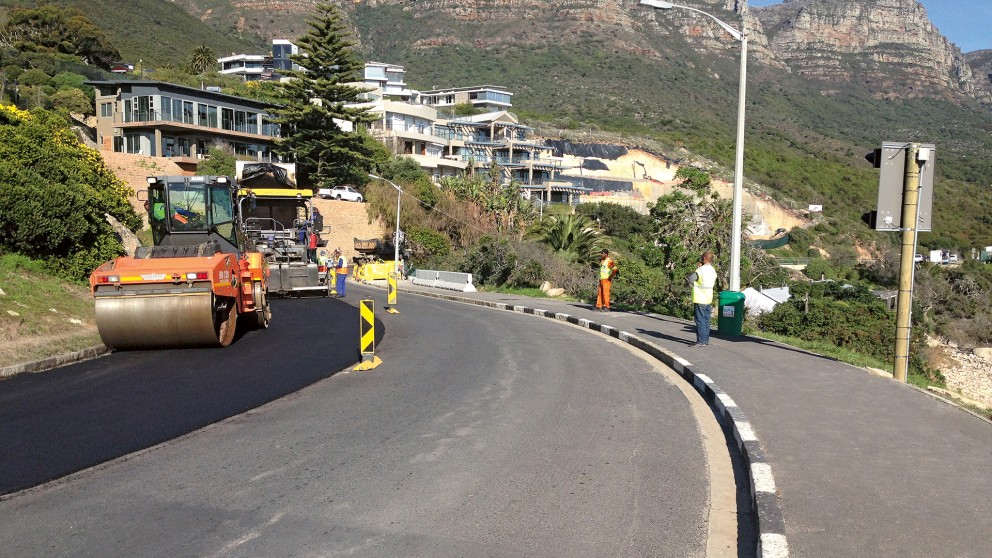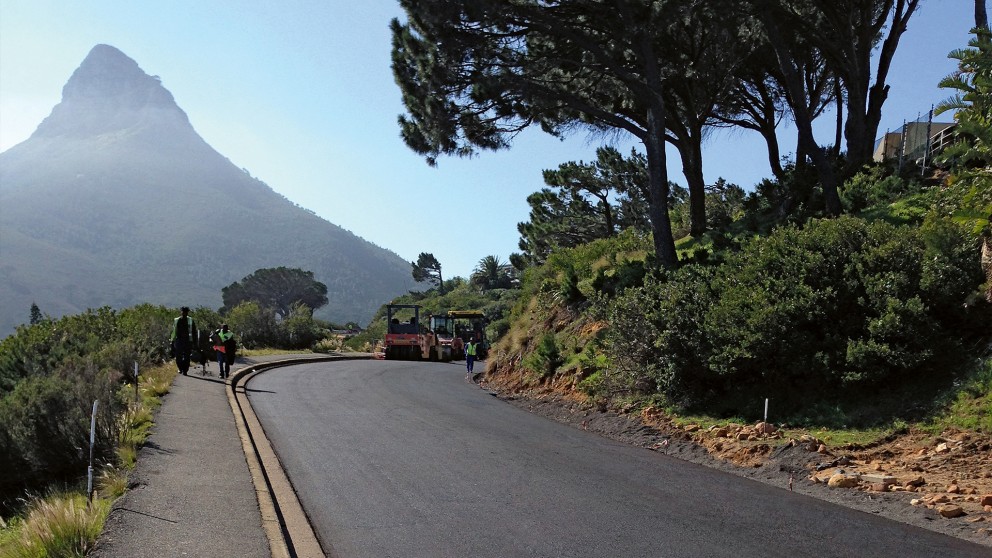Rehabilitation of Camps Bay Drive in Cape Town with Wirtgen Cold Recycling Technologies
Camps Bay Drive is a major scenic route within the City of Cape Town and provides access to Camps Bay and Hout Bay. Based on the project brief and geometric analysis, Camps Bay Drive required widening to safely accommodate the high volumes of tourists and MyCiti bus traffic. In order to minimize the impact on traffic, the design brief targeted construction outside the summer peak tourist season and also required investigation into shortened construction periods. The key role was played by Wirtgen cold recycling technologies. In action: the mobile cold recycling mixing plant KMA 200.
The South African metropolis has large volumes of Reclaimed Asphalt (RA) stockpiled from numerous maintenance works undertaken around the City. This material has generally been used for hard stand areas and shoulder construction, In order to reuse this high quality material, WorleyParsons was tasked to investigate a more efficient and sustainable use for this material. For this reason, the use of a foamed bitumen technology was investigated and the base layer on Camps Bay Drive was constructed using 100% RA as a foamed Bitumen Stabilise Base (BSM) base layer.

At the Ndabeni Roads and Stormwater Depot in Maitland, the Wirtgen cold recycling mixing plant KMA 200 quickly and reliably produced the BSM mix.
Originally, the project consisted of localized road widening to accommodate the proposed MyCiti buses however due to the large volume and sizes of the proposed buses, a geometric analysis resulted in the entire portion of the road being widened by 1,4 m. The proposed pavement design involved a light rehabilitation with the widening area requiring full depth construction however during construction, numerous weak horizons were discovered along the road. The pavement design implemented for construction involved the following:
The project was divided into three construction sections. Section 1 from Geneva Drive to Prima Avenue, Section 2 from Prima Avenue to Rontree Avenue and Section 3 from Rontree Avenue to Houghton Road.
In order to ensure more uniformity and better quality of the mix, a static mobile mixing plant was specified for production of the BSM.
Power Construction was appointed to carry out the construction of the works with Milling Techniks carrying out the production of the BSM using their Wirtgen KMA 200.
During construction, the stockpiled RA was sent for technical testing at BSM Laboratories in Durban. The design was carried out on three design options using the two dedicated stockpiles of materials from two sources which were created for the project by the City. The design options included:
Based on the results obtained, the most cost effective option to yield a BSM 1 was the 100% Reclaimed Asphalt mix design using 2.1 % foamed bitumen with 1 % cement.
The batching plant was set up at the Ndabeni Roads and Stormwater depot in maitland. The depot provided sufficient space to establish the KMA 220 as well as allowing for the stockpiling of the unprocessed RA, screened RA and processed BSM. The specification called for crushing of the RA to remove the oversized fractions. An alternate proposal in the form of screening the material to minus 19 mm in place of crushing the material by the contractor was accepted provided the fines fraction (0.075 mm) met the specification of 4 %. This was monitored for the duration of the project with a fines fraction of between 3 % and 4 % recorded. The screened RA was processed using the KMA to form a BSM 1 which was stockpiled for up to 7 days at the depot
In order to ensure an adequate quality of the BSM and consistency within the mixing process, Power Construction, Milling Techniks and WorleyParsons created a quality system tailored for the BSM production using the KMA. This was implemented to ensure the mix met the BSM 1 specification throughout the project. Once the BSM was produced, the material was either placed on site immediately or protected and stockpiled at the Ndabeni Depot.

The proper recipe and professional BSM producing of the Wirtgen cold recycling mixing plant were the key factors for a successful project. Immediately after paving with a Vögele paver and compaction with Hamm rollers, parts of Camps Bay Drive could be reopened to traffic.
The BSM was paved using a heavy duty tracked paver from Power Construction in two 100 mm thick layers in the same process.
The process used to get the required 100 % Minimum Dry Density (MDD) compaction was as follows:
Before starting with paving and compaction, a testing of the BSM was undertaken by Soillab who established a testing rig in accordance with the TG2, 2009 specification. Acceptance control was carried out on the Indirect Tensile Strength (ITS) and MDD taken from the batching plant and site samples.
The three sections identified were constructed using similar techniques, however in Section 1 and 3, the BSM was opened to traffic immediately after construction and in some cases 24 hours after construction.
The Camps Bay Drive rehabilitation project allowed for numerous lessons when dealing with BSM’s and more particularly 100 % RA BSM’s. The following lessons were learnt during the project:

After the rehabilitation project, Camps Bay Drive in Cape Town presents itself 1.4 meters broader and therefore much more secure to accommodate a constantly increasing traffic volume. Thanks to the cold recycling application, rehabilitation is a sustainable and cost effective solution with a high quality level.
The following positives were established during the product when using the 100 % BSM:
Overall, the project was a major success. During the project, approximately 8,150 t of RA (4,200 m³) was processed using 165 t of bitumen and 78 t of cement. Using the RA within the pavement structure provides a much more cost effective and sustainable solution for the future with depleting aggregate resources.

Public Relations
Reinhard-Wirtgen-Straße 2
53578 Windhagen
Germany